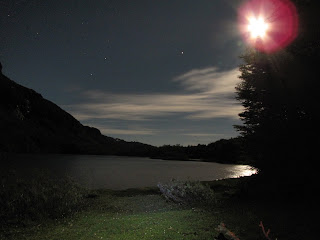
A night photo from Lago Natacion, where we camped out one night.
Until this point, much of our plans have been pre-determined, but we did not have any idea of what would be next... una adventura! To further the feeling of putting ourselves into the unknown, we decided to complete a several-day hike across the Argentine border into Chile. The hike follows the north side of Lago Puelo, and then Lago Inferior.
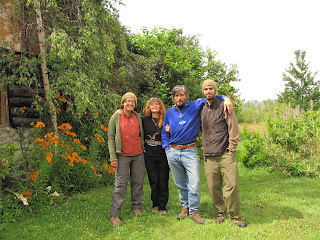 Us with Claudio and Rosalind, of Chacra Temaukel.
Us with Claudio and Rosalind, of Chacra Temaukel.We said our good-byes to Claudio and Rosalind, and took a taxi to La Paserela of Rio Azul. Normalmente, one would ford the river closer to the Lago, but there has been much rain this summer and the river is too high. This added about 6-8 km to our journey, through farmland and a trail that came and went like the wind. The night before had been incredibly windy, and the weather untamed, and as we walked we were not sure if we would encounter any sudden downpours. Our bags were incredibly heavy, since we have everything for our entire 8 month journey, making ascending and descending much more difficult than even with just a backpacking pack (which would carry only camping gear).
This first day we got only minimally wet, and set up camp near the lake. The next morning, we got our passports stamped out by the Argentinos, and walked the last 4 km to el limite con Chile. The forest is beautiful, wet, green, remniscent of the PNW but different. The rain was drizzly but incessent. For these first couple of hours we were in good spirits despite the cold and damp.
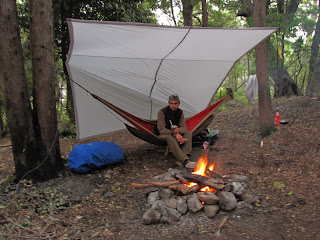
Jameson sitting by our first night camp.

Made it to Chile. It says Argentina on the other side.
After reaching the border, the last 7 km to the Chilean Carabineros seemed to last forever. The rain continued. We got wetter with each step, the brush encroaching on our legs and sides, the wind blowing big drops off the leaves of the trees to wet our packs and shoulders. No longer did we care about the scenery. Our feet were wet all the way through, and each step upward became more painful the further we went due to the weight of our loads. When we finally arrived, we were rewarded with a passport stamp that says something like ¨Reten de Paso El Bolson¨, and were given vague directions in choppy Chilean to the boat to Segundo Corral and to a campsite. The campsite was crappy, and we walked in a thousand wrong directions before finding the boat to cross the river, when we did it was too late to cross.
Instead, we encountered 7 Chilean kids from Santiago rogue camping, upon seeing our damp and disheveled selves they offered us tea or mate. We gladly accepted, and the evening ensued with a most lovely cultural exchange. We talked late into the night, drying off by a smoky fire of damp wood, playing a guitar and melodica (a plastic piano-type instrument which you blow into to make noise) and singing a mix of American and Chilean music. They knew a bit of English (one of them was really good) which facilitated communication, particularly as our Spanish diminished as the hours moved to the wee of the morning. Though we had been miserable during the last part of the hike, it was vale la pena to experience this sort of cultural encounter.
The next morning, sufficiently rested, we walked the 3 km to Segundo Corral. This began by calling across the Rio Puelo, for the boatwoman to take us over the river. Then we walked through unmarked gates through farmland and forest. The goal for today was just to rest after such a rough day beforehand, and this we did. We were pretty much out of food and followed a sign ¨Hospedaje¨ to find three men shoeing a horse, who showed us to the door where we asked for dinner, and received some bread for the meantime.
Segundo Corral is a small village of about 50 people. They do have a post office, and a supermarket, and there are about 6 houses in a line, the rest of the homes are on surrounding farms set back in the woods. No roads that can carry vehicles exist in this town. The sole means of transportation is by horseback or foot. Sheep, cows, and chickens roam free. There is a hydroelectric project in the works to bring electricity, and I saw one solar panel (although it seems they may have had electricity at some other point... not sure). Being there was like taking several steps back in time.
We had an opportunity to truly experience Segundo Corral the following day, as we woke up at around 5 am, with rain encroaching through our tarp and beginning to seep into our hammocks. It was terrible. We packed up, and eventually headed back to the hospedaje, where we had arranged for breakfast. The day was passed there, and the night. We huddled around the fire for warmth and to dry off, and observed the very traditional ways of life that we were submersed in.
... the woman of the house told me of a handful of Patagonian trees for making dyes
... the son told us of and showed us pictures of the wild boar hunts that he has participated in
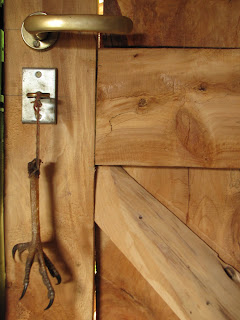 ... the key ring was made of a chicken foot
... the key ring was made of a chicken foot... a sheep carcass hung in the kitchen, insides cleaned out (I think our first nights dinner consisted of sheep intestines)
... the men wore woolen ponchos and classic hats when they went out into the rain
... the main form of communication was by some sort of CB radio, which everyone in the town had
... we listened to them play Chilean folk songs and sang them American songs in return
... the whole family came and went, old papa with a grey beard and smiling glints in his eyes
... cooking takes up the entire day, making bread and biscuits and sopapillas (fry bread), and hand made potato chips
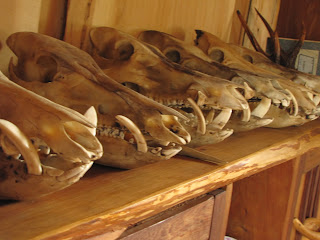 Wild boar skulls displayed in the dining room.
Wild boar skulls displayed in the dining room.
It is a really difficult experience to put into words, but will live on in my memory forever.
The next day, we walked to where we would eventually catch the bus. We left an hour late and missed it, necessitating that we camp one more night. Following the instructions of the Alegrias (the family who ran the hospedaje), we called out at the the only house we saw about 20 minutes after we passed the bridge. Three kids came out: two boys, one with a bb gun, and a little girl with disheveled hair. They invited us in, and let us camp near the catarata (waterfall) on their land. They sold us some homemade bread, eggs, and from their garden, chard, carrots, and green beans.Yesterday morning we walked from the catarata, to the first road. It is a road in the process of being extended, and is the ugliest thing I´ve seen in a while... a tear through the landscape. We continued up it until it seemed fit for a vehicle to manage. The family radioed to the driver that two people would be waiting, and so it extended its route and picked us up. And then... through more and more ´civilized´ type places... to Puerto Montt.
Puerto Montt is built of bending wood and sheet metal, with peeling paint of a thousand colors (if you count the hues infused with rust, grime, and sunbleaching), with lonely dogs sleeping in the streets and street vendors selling every sort of thing. It is a city growing rapidly due to the salmon industry, which has exploded with salmon farming off the coast. We will only be here for a couple of short days as we prepare to go to the island of Chiloe.
This was a very interesting tale and had me reading it right to the end. I have a daughter who lives close to Pto. Montt and will be visiting her soon, This kind of true description really put me in the mood since when I was a lot younger I used to camp all over the place. Thank you for your article, it made me feel good.
ReplyDelete